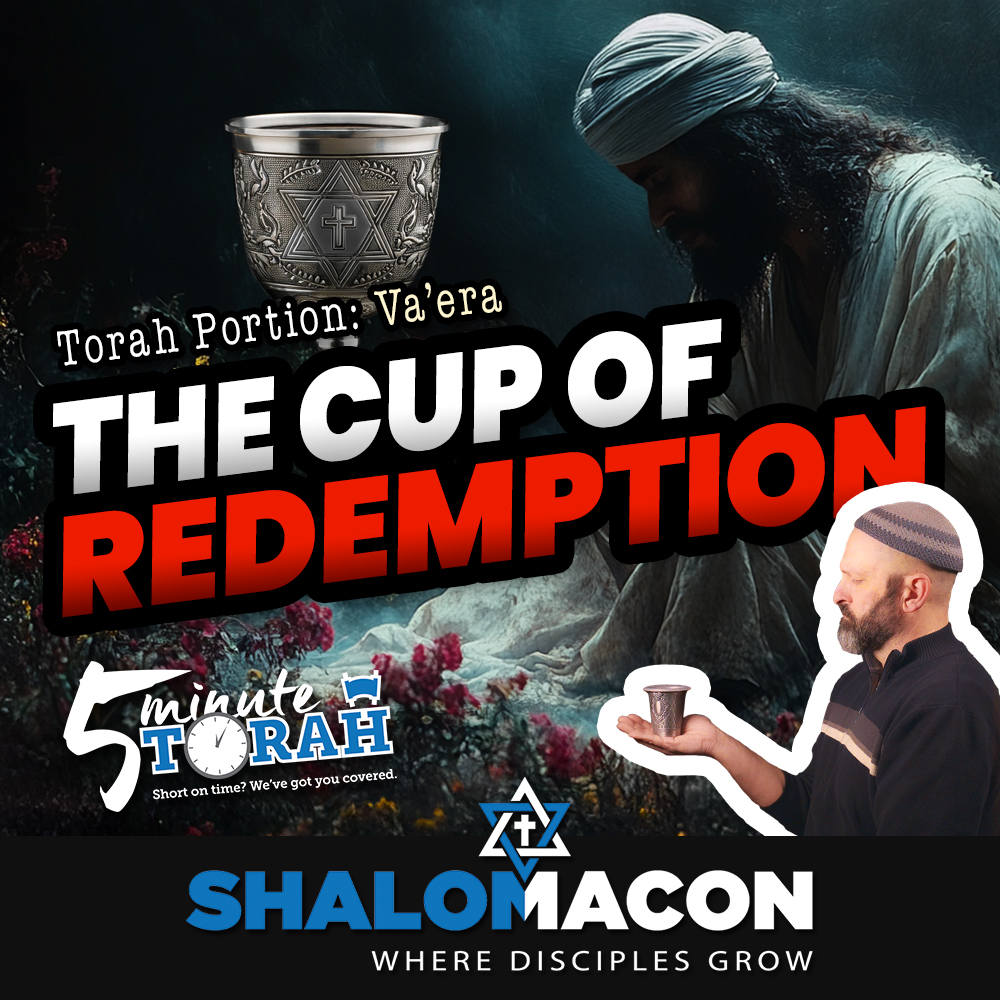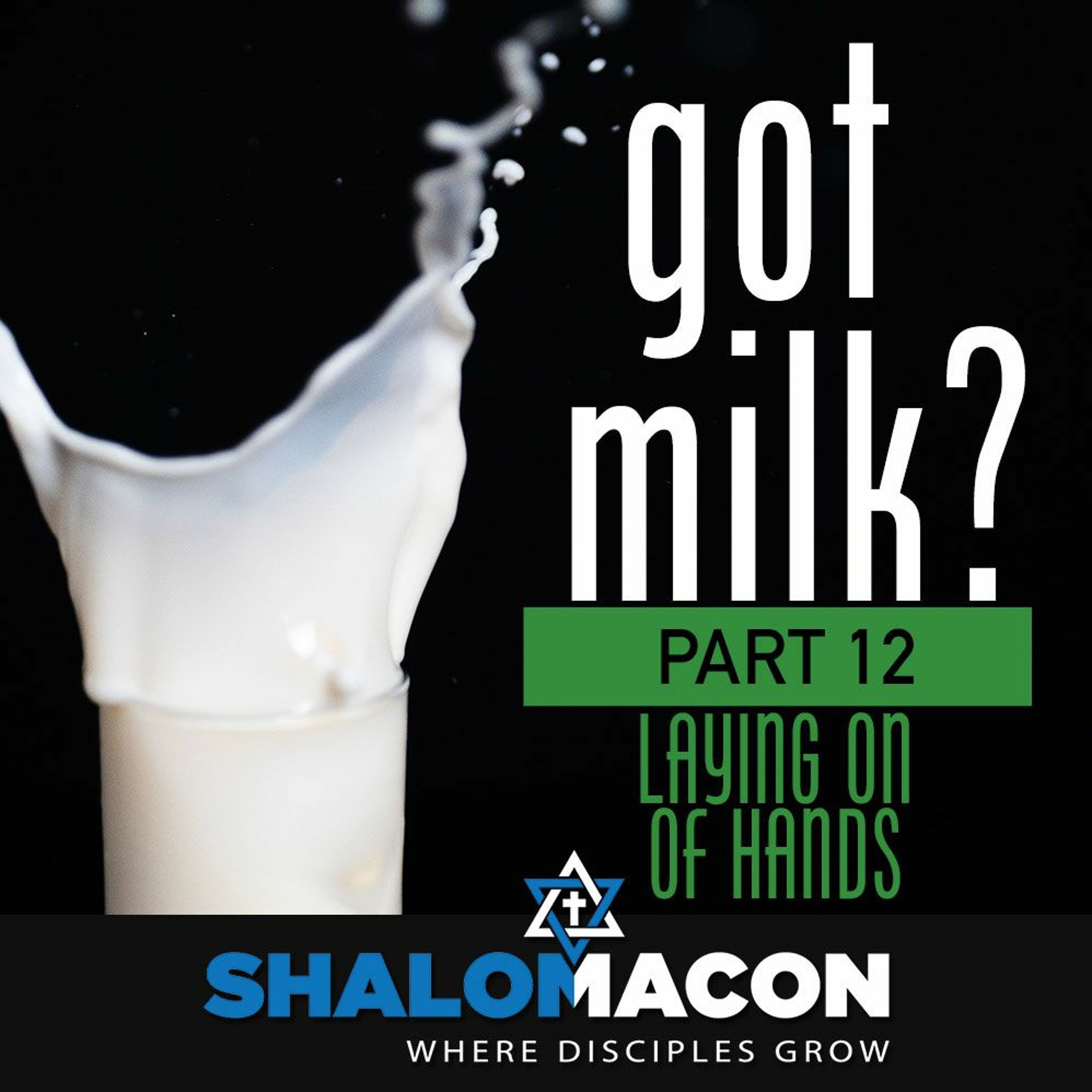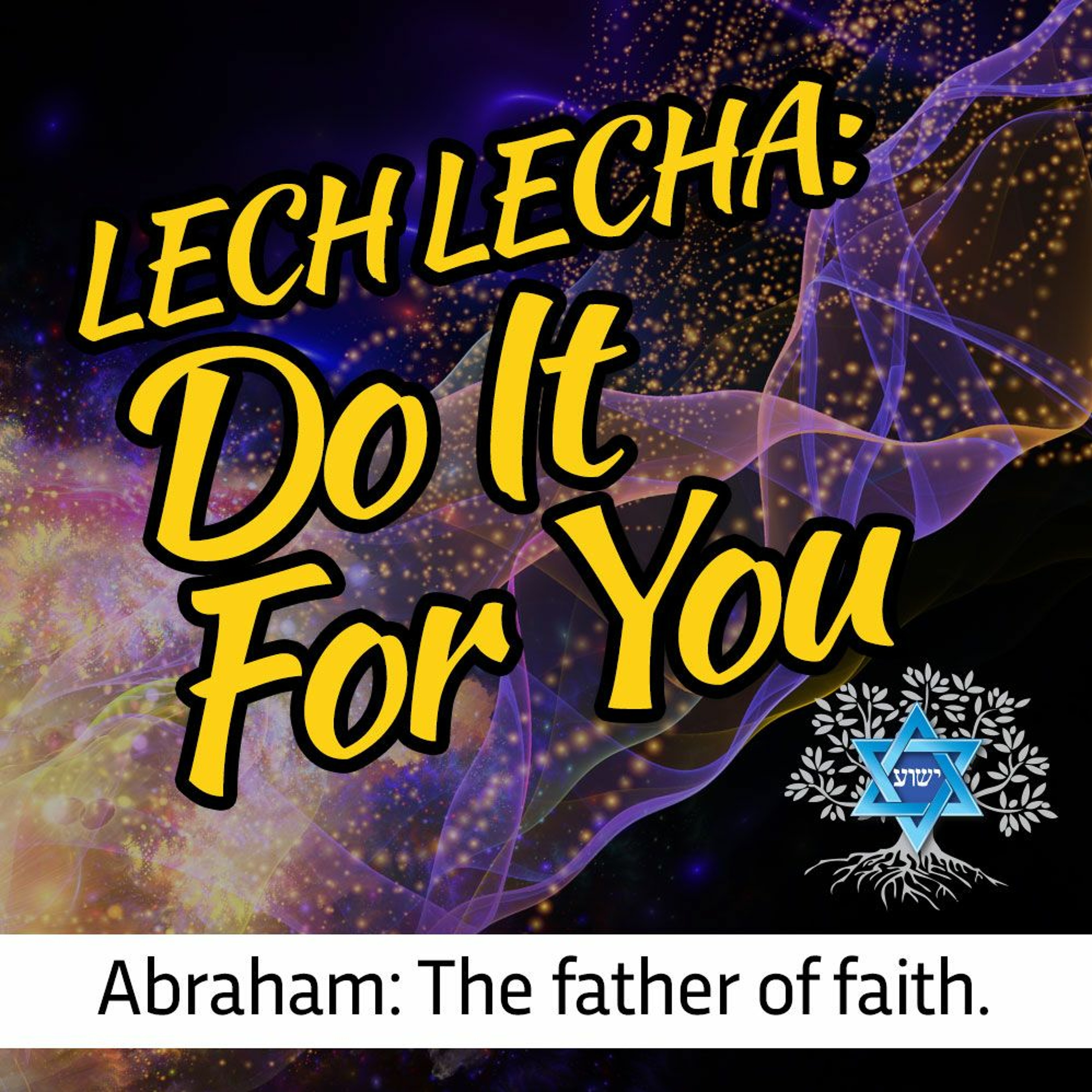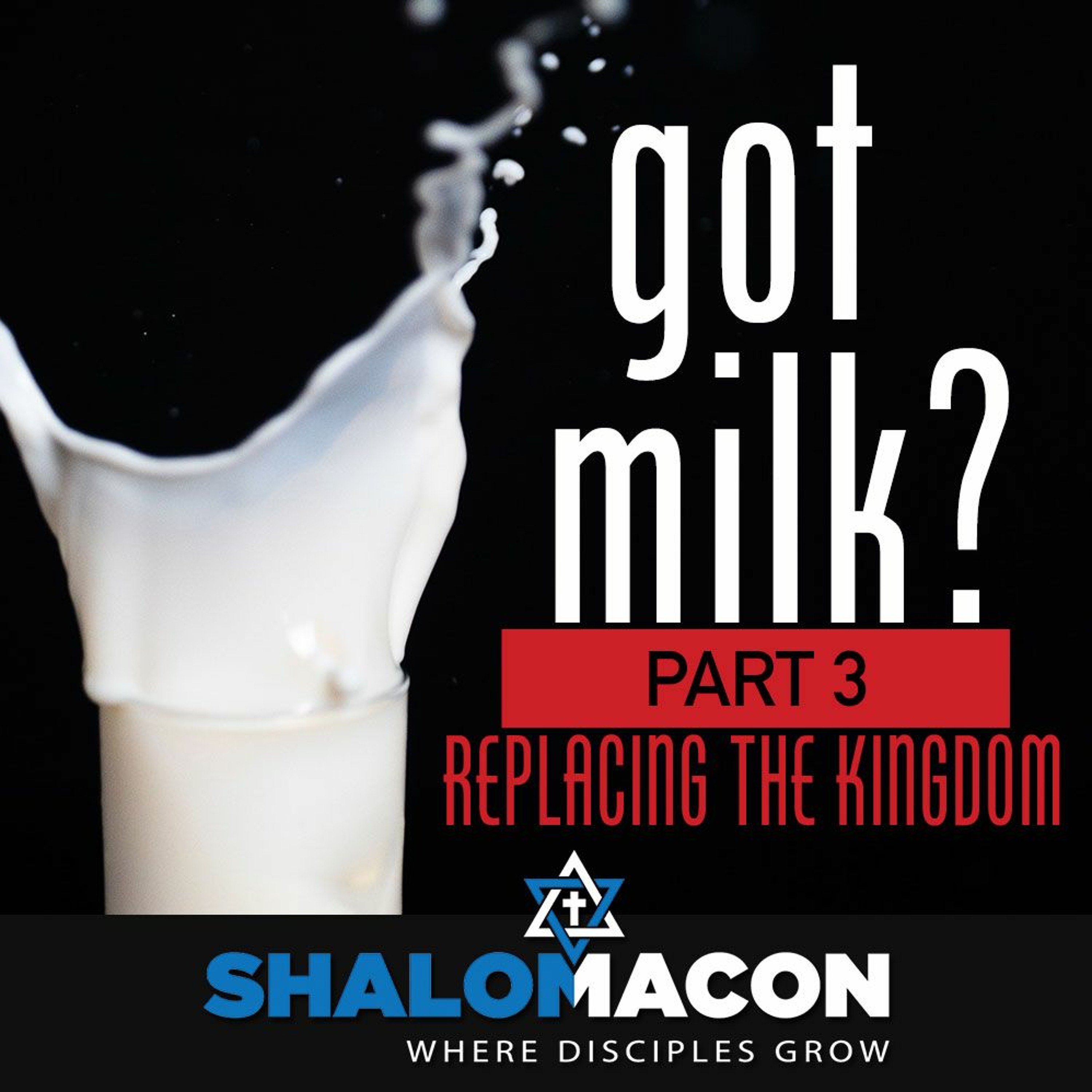Episode Transcript
[00:00:00] Speaker A: At his last meal with his beloved disciples, Yeshua shared a cup of wine with them, saying, this cup is the new covenant in my blood. Do this as often as you drink it in remembrance of me. Later on that night, he went to the Garden of Gethsemane on the side of the Mount of Olives in order to pray. As the light of the full moon beamed down from the night sky and sweat rolled down his face like great drops of blood, he prayed, father, if you are willing, remove this cup from me. Nevertheless, not my will, but yours be done. Have you ever thought about the symbolism of this cup that Yeshua is referring to and exactly what this is? We might just find the answer in this week's five Minute Torah Shalom and blessings from Shalom Macon, the place where disciples of Yeshua learn, connect and grow. I'm Darren and before I get into the five minutes of my five minute Torah commentary, let's cover a few quick facts about this week's Torah portion. This week we are studying the portion of Va'era. This is Exodus 6:2935 and here are the three things that you need to know about it. Number one uncircumcised lips Moses doubts his calling again. Just like last week, this week we hear Moses doubting his ability to do what God has called him to do. He doesn't believe he can persuade either Pharaoh or the Israelites to trust in his God given authority. Despite God's assurances and promises of deliverance, Moses hesitates due to a perceived inadequacy in his ability to be the mouthpiece of God. Questioning his capability to effectively convey God's commands. He describes his condition as being one of uncircumcised lips. However, God reaffirmed Moses role and provided him reassurance. Stating that Aaron would act as his spokesperson. He told Moses that even though Pharaoh might resist despite witnessing his miraculous signs, the ultimate goal was to show God's unlimited power, ensuring the recognition of his sovereignty by both the Egyptians and the Israelites. Success wasn't dependent upon Moses. He was only a tool in the hands of the King of the universe. Number two the plagues begin. 7 of 10 in this week's Torah portion we read about the beginning of God's judgment on Egypt. We learn about seven of the ten plagues that God inflicted on Egypt. The waters of the Nile turn to blood. Swarms of frogs overrun the land. Lice infest both man and beast. Hordes of wild animals invade the cities. A pestilence kills the cattle. Painful and unsightly boils afflict the Egyptians and a combination of fire and ice descend from the skies to destroy all that remains. Still the heart of Pharaoh was hardened and he would not let the children of Israel go, as God had told Moses and number three, the heart of Pharaoh who did the hardening. After each of the first five plagues, we read that Pharaoh's heart was hardened, but when it came to the sixth plague, we read, but the Lord hardened the heart of Pharaoh. This topic is one that has troubled people for centuries. The question always comes up if God hardened Pharaoh's heart. Does man really have free will or not? How do we resolve this? The Midrash says that when God saw that Pharaoh did not relent after the first five plagues, he declared, he's already gone too far. Even if Pharaoh wants to repent now, I will harden his heart in order to exact full punishment from him. Therefore, God reinforced the choice Pharaoh had already made. In order to show his mighty hand against the enemies of Israel, Pharaoh had made his choice. Now it was time that God was magnified through his bad choice Are you.
[00:03:35] Speaker B: Ready to take your Passover Seder to the next level? Do you want to have a meaningful.
[00:03:39] Speaker A: Connection to Yeshua during Passover? Then grab a copy of cup of.
[00:03:42] Speaker B: Redemption, my Messianic Passover Haggadah, and crank it up a notch. It not only walks you through the traditional Seder, but it also connects Yeshua's last meal and his suffering with the various elements of the Seder. It's great for homes and Messianic synagogues as well as churches, and gives step by step instructions for conducting your own Seder. It also includes an appendix with articles that answer many questions and objections people might have about a traditional Seder, like why do we have an egg on the Seder plate? And what's considered leavening? And is price low enough to snag a copy for everyone at your Seder table? Just use the link in the description box below to gear up early so you can be ready to make this Passover your best Passover this week's Torah.
[00:04:17] Speaker A: Commentary is called the cup of Redemption. It comes from a book, Five Minute Torah, Volume 3. When it was time for the Lord to deliver the children of Israel from Egypt, God poured out his judgments on Egypt to demonstrate his power and allow time for the Egyptians to repent. But before any of this took place, the Lord made multiple promises to the children of Israel for what he was about to do. Say therefore to the people of Israel, I am the Lord and I will bring you out from under the burdens of the Egyptians. And I will deliver you from slavery to them. And I will redeem you with an outstretched arm and with great acts of judgment. I will take you to be my people, and I will be your God. And you shall know that I am the Lord your God, who has brought you out from under the burdens of the Egyptians. This is Exodus 6, verses 6 and 7. In this passage, God reveals four specific things that he will do for the children of Israel. Number one, release them from harsh labor. Physical release. Number two, free them from their enslavement, a legal release. Number three, take them out of Egypt, a physical transfer and number four, make them his own people, a legal transfer These promises to Israel were fulfilled when the Lord delivered His people from Egypt. They each have a unique aspect to them and eventually became part of the Passover Seder tradition. They became what is known as the four expressions of redemption, with each promise corresponding to one of the four cups of wine that are consumed throughout the course of the Seder. A fifth expression, however, follows in the very next verse. I will bring you into the land that I swore to give to Abraham, to Isaac and to Jacob. I will give it to you for a possession. I am the Lord. This is Exodus 6:8. This final promise is both historic and prophetic. It's historic in that God did bring the children of Israel into the land he promised them through the leadership of Joshua. It's prophetic because they would eventually be driven from the land but would one day return to it. Although all of this happened thousands of years ago, another prophetic aspect of this is still yet to be fulfilled. Although the nation of Israel has been reborn in our day, the government is not under the rule of Torah and the majority of the Jewish people are still in exile. One day the Lord will gather them back into the land he apportioned for them and establish his rule over his people once again. This last promise is connected to the first four promises. God ends the first series of promises the same as the last promise. He concludes with an emphatic statement of his identity, I am the Lord. Why does he conclude each of these promises with this reminder? Because he is reminding the children of Israel that He is a covenant keeping God. But the fifth promise is different from the other four. The first four have happened in their entirety. The fifth, however, has been experienced only intermittently. Historically, Israel has remained in exile because of the very real nature of the Galut, the exile. Our sages were unclear how this final promise could be equivalent to the first four. Therefore, the final promise is remembered in the cup of Elijah that sits at our Seder table. By drinking the four cups and setting out the cup of Elijah on Pesach, we testify that four of these have already taken place and proclaims that one day the last promise will be fulfilled entirely. Two thousand years ago, our Master Yeshua remembered these promises as he shared his cup of wine with his disciples at the final Seder. Later on that night, as he prayed in the Garden of Gethsemane, he prayed about another cup he would have to drink. He said, father, if you are willing, remove this cup from me. Nevertheless, not my will, but yours be done. This is Luke 22:42. He ended up drinking that final bitter cup on our behalf. At the Seder, we drank four cups of wine to remember what God did when he redeemed the children of Israel from Egypt. But in each of these cups we should also remember that Yeshua drank the cup of redemption on our behalf. He bore our shame, and by doing so he turned judgment into forgiveness. And for this we should be grateful and spend our days remembering our moment of redemption and working toward the ultimate redemption in which the entire world will be transformed and Yeshua will reign as king. And just as the story of Yeshua's redemption begins with his shame, the mission states that we should begin telling the Passover story with shame. Interested? If you want to understand what that means, then check out our teaching. Passover begins with shame. Just click on the link right here.



